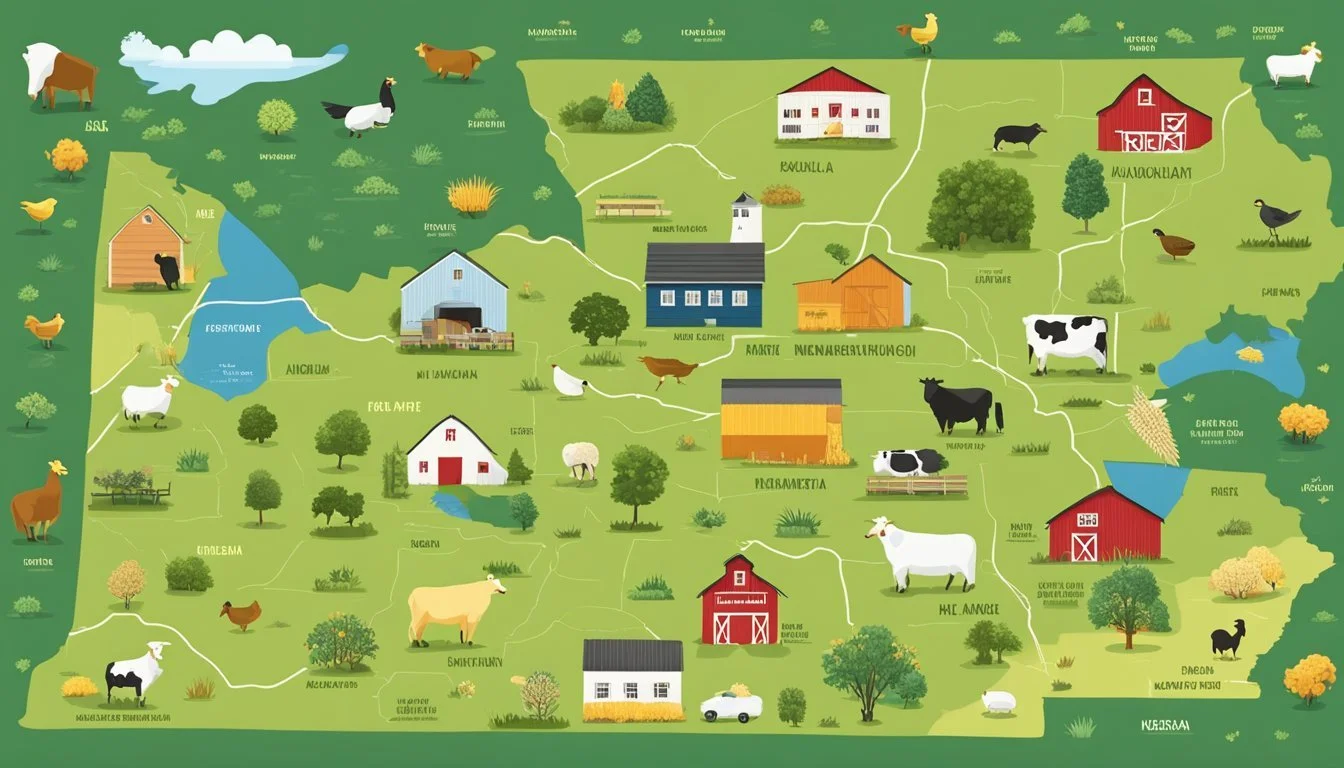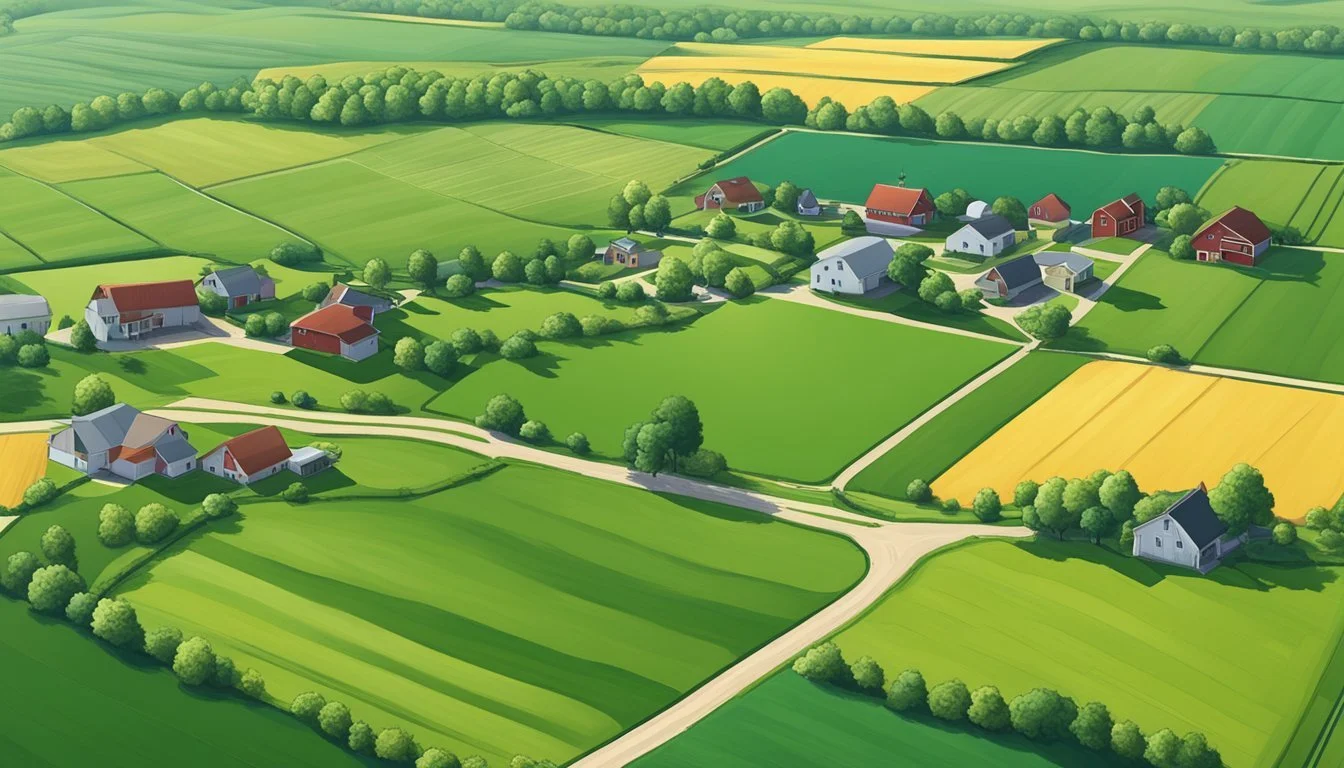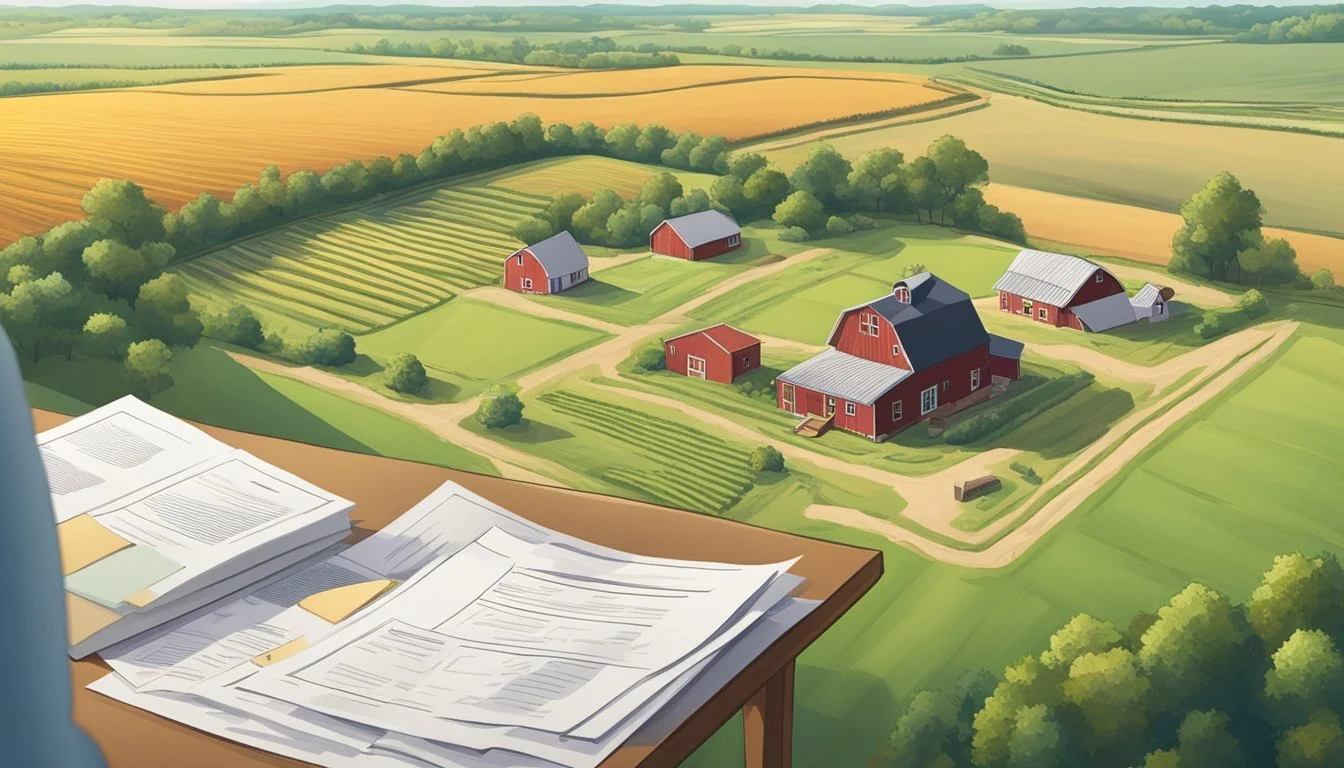Small Farms for Sale in Nebraska
A Buyer's Guide to Rural Investments
This Article is Part of State-by-State Guide to Buying Your First Small Farm
Nebraska's diverse agricultural landscape offers a myriad of opportunities for those seeking to purchase small farms. With properties ranging from 18 to several hundred acres, these farms present a platform for a variety of agricultural ventures, from traditional row crops and livestock to specialty and boutique farming operations. The state's fertile plains are well-suited to agriculture, making it a prime location for emerging farmers and established agriculturalists looking to expand their footprint or diversify their operations.
In the current market, small farms across Nebraska come with varying amenities, including modern homes, outbuildings, and sometimes even established irrigation systems. The offerings cater to a range of budgets and needs, with recent listings showing properties in counties like Wayne, Lancaster, and Gosper. While smaller acreages, like a 3.75-acre farm in Antelope County, may appeal to hobbyists or those looking for a rural lifestyle, larger tracts provide the space necessary for substantial farming activities.
The significance of agriculture to Nebraska's economy underlines the potential value of owning farmland in the state. Whether located in the rolling hills of the Southeast region or the flat, expansive fields in the Panhandle, Nebraska's small farms for sale demonstrate the state's agricultural potential. With the right management, these properties can be the starting point for a successful and sustainable farming enterprise.
Understanding Nebraska's Farm Market
Nebraska's farm market is characterized by diverse offerings and fluctuating trends. Buyers in this market should pay close attention to the current agricultural trends and the various factors that influence farm values to make informed decisions.
Current Trends in Agriculture
The agricultural landscape in Nebraska is witnessing a trend where small farms ranging in size from a modest 18 acres to over 200 acres are available for sale. It is not uncommon to find listings such as a 4,100 square foot property with 3 bedrooms in Wayne County, priced at $594,000, or a 31-acre farm in Lancaster County with a higher price point of around $650,000. Listings are diverse, with varying size and price points, reflective of the market's range such as a 203-acre land in Gosper County at $445,000 or properties exceeding $1 million, hinting at the market's appetite for substantial agricultural investments.
County Size (Acres) Building Size (sq ft) Bedrooms Price (USD) Wayne 18 4,100 3 594,000 Lancaster 31 N/A N/A 650,000 Gosper 203 N/A N/A 445,000
Key Factors Influencing Farm Value
Several factors play a significant role in determining the value of farm real estate in Nebraska. The price per acre is a crucial metric that informs the listing price and is influenced by the farm's location, land quality, water availability, and existing structures. For example, an 8-acre farm in Knox County with a 1,292 square foot, 3-bedroom home might go for $360,000, which is approximately $45,000 per acre. In contrast, larger properties, such as a 40.3-acre farm in Otoe County, command prices like $600,000, not solely due to their size but also driven by factors like the usability of the land, accessibility, and potential for agricultural productivity.
Key factors influencing farm value include:
Location: Proximity to markets and urban centers.
Land Quality: Soil fertility, topography, and potential yield.
Water Rights and Access: Essential for irrigation and livestock.
Infrastructure: Buildings, equipment, and connectivity.
Market Dynamics: Demand for certain types of farms and prevailing economic conditions.
Types of Small Farms Available
Nebraska's small farm market caters to a variety of agricultural interests, offering properties suitable for specific uses as well as smaller-scale hobby farms and farmettes. These lands provide opportunities for personal cultivation or commercial agriculture on a more manageable scale.
Acreage for Specific Use
Buyers looking for acreage for sale in Nebraska can find land ranging from a few to several hundred acres tailored to specific agricultural pursuits. Properties typically have functional features based on their intended use, such as pastures for livestock or irrigated land for crop production. For example:
Acreage for goats: Small farms with 10-50 acres are ideal for raising goats, often featuring fencing and shelters suited for caprine needs.
Agricultural land: Listings often specify if the land is suitable for row crops or hay production, with details about soil quality and water access.
Hobby Farms and Farmettes
Hobby farms and farmettes in Nebraska offer a lifestyle balance between the rural countryside and the convenience of modern amenities. These small-scale properties typically fit those looking for a recreational farm or a sustainable living environment. Characteristics include:
Hobby farms: Acreage ranges from 5 to 50 acres, commonly including a comfortable residence alongside functional outbuildings like barns and workshops.
Rural mini farms: These properties provide a seamless entry point for those new to farming or looking to maintain a self-sufficient homestead.
Country farmettes: Farmettes are small rural properties, often under 10 acres, that allow for personal cultivation of crops and raising a variety of animals, serving as an introduction to the farming lifestyle without the commitment of large-scale operations.
Listings by County
Nebraska's agricultural landscape is punctuated by small farms and ranches, with a variety of listings spread across the eastern, central, and western regions of the state. Each region features its own range of counties with properties that reflect the diverse farming opportunities the state has to offer.
Eastern Nebraska Counties
In the eastern part of Nebraska, Lancaster County has a notable presence with small farms available in areas like Walton, while Antelope County also contributes to the listings in the region. Not far behind, Wayne County presents farms with ample acreage and residential facilities.
Lancaster County: Small farm listings, highlighted by a 31-acre property in Walton.
Antelope County: Known for its smaller plots, such as a 3.75-acre farm recently on the market.
Wayne County: An 18-acre farm with a spacious home was recently listed in Wakefield.
Central Nebraska Counties
Central Nebraska offers a blend of agricultural land, with listings in counties like Gosper and Dawson providing a taste of Nebraska's heartland farm life. These listings typically offer larger tracts suitable for both farming and ranching.
Gosper County: A 203-acre farm was up for sale, indicative of the available space in this region.
Dawson County: This county regularly features in farm listings; details on acreage and amenities vary greatly.
Western Nebraska Counties
The western regions hold vast expanses of land in counties such as Scotts Bluff and Kimball. These areas are known for sprawling properties that often encompass hundreds of acres, reflecting the open spaces and rural nature of Nebraska's panhandle.
Scotts Bluff County: Multiple farm and ranch listings, including seventeen properties varying in size and price.
Kimball County: With around ten listings, this county offers a range of farm sizes, some extending over several hundred acres.
Each of these counties represents a unique aspect of Nebraska's agricultural heartland, with listings that cater to various farming scales and lifestyles. Whether one is looking for a large ranch in the west or a manageable small farm in the east, Nebraska's diverse counties have much to offer.
Assessing Property Value
When buying a small farm in Nebraska, it's crucial to understand the property's value, which is often reflected in the price per acre and the overall purchase price. These two components are key factors in the assessment process.
Understanding Price Per Acre
The price per acre of agricultural land is a critical metric for comparison and assessment. In Nebraska, farmland values can vary widely based on location, soil quality, and available water rights. Buyers should note that small farms may have a higher price per acre compared to larger parcels of land due to the increased potential for personal or hobby farming, smaller scale agriculture, or desirable locations.
Example Listing: A farm in Wayne County is listed at $594,000 for 18 acres, yielding a price per acre of approximately $33,000.
Buyers should analyze listings and compare them with recent sales in the region to gauge whether the price per acre is competitive.
Calculating Purchase Price
The purchase price of a Nebraska farm is not only determined by the size of the property but also by its amenities, buildings, and any additional features that may add value, such as a well-kept farmhouse or newer agricultural facilities.
To calculate the purchase price, one must consider the following formula:
Purchase Price = Price Per Acre × Total Acres
For example, if a small farm in Lincoln County is 32 acres at $475,000, this indicates a rate of approximately $14,844 per acre.
Property Size: 32 acres
Purchase Price: $475,000
Price per Acre: $14,844
Potential buyers should conduct a thorough analysis, including an on-site visit and consulting with a local assessor to ensure all factors affecting value are considered before making an offer.
Small Farm Management
Effective management of small farms in Nebraska is crucial for optimal productivity. Attention to detail in livestock farming and sustainable crop production is particularly imperative for success.
Livestock Farming
Small farm owners in Nebraska often focus on various types of livestock, primarily goats, sheep, and poultry. Goat farming is a versatile operation as these animals are raised for their milk, meat, and fiber. When raising goats, herd health is a key factor, so regular veterinary check-ups and vaccinations are essential. Similarly, sheep farmers need to maintain strict flock management practices, including shearing and hoof trimming, to ensure animal welfare and farm profitability.
Poultry farming, often incorporating chickens, ducks, or turkeys, requires attention to feed quality and housing conditions. Appropriate shelters protect the flock from Nebraska's weather extremes and predators. It's also important to manage the flock size to prevent overcrowding, which can lead to disease outbreaks.
Crop Production and Sustainability
Crop production on Nebraska's small farms must balance efficiency with sustainability. Crop rotation and the use of cover crops are sustainable practices that maintain soil health and reduce the need for chemical fertilizers:
Crop Rotation: Planting different crops sequentially to avoid nutrient depletion.
Cover Crops: Utilizing plants such as clover or rye to prevent erosion and improve soil quality.
Nebraska farmers may also choose to engage in organic farming practices to meet market demand for organic products. They must adhere to regulations that prohibit synthetic pesticides and fertilizers, thus ensuring adherence to sustainability principles.
Integrated Pest Management (IPM) is a critical aspect of crop production, which involves monitoring and managing pest populations using environmentally sensitive methods. It can be particularly challenging yet important for maintaining long-term viability of crops without causing undue harm to the surrounding ecosystem.
Buying Process
When looking to purchase small farms for sale in Nebraska, buyers should understand the steps involved from searching for the right property to finalizing the purchase. Adherence to these stages ensures a smoother transaction.
Searching for Farms
Buyers should start by determining their specific needs, including the size of the farm, types of facilities required, and intended use, such as for livestock or crops. They can then scour listings on real estate platforms or reach out to local agents specializing in rural properties in Nebraska. It's essential to consider the average listing details, like the average price of $491,038 and price per acre of $17,114, as mentioned in the search results.
Making an Offer
After identifying a suitable small farm, buyers typically proceed by submitting a written offer through their real estate agent. This offer should reflect careful consideration of the market values in Nebraska and any ancillary costs likely incurred. Any terms or conditions, like passing an inspection or securing financing, should be explicitly stated in this offer.
Finalizing the Purchase
Following acceptance of the offer, the buyer should perform due diligence, which includes property inspection, verification of ownership, and ensuring there are no encumbrances on the property. The final step involves signing the sales contract, paying any relevant closing costs, and transferring the deed. Buyers may find farm properties that come with additional features or land leases, such as the Broken Box Ranch, which comes with both deeded and leased acres, ideal for a mix of cattle production and wildlife hunting.
Legal and Financial Considerations
When purchasing a small farm in Nebraska, buyers must carefully evaluate zoning requirements and land use regulations, as well as secure appropriate financing and insurance. These factors are essential in determining the feasibility and sustainability of their agricultural ventures.
Zoning and Land Use Regulations
Zoning ordinances can significantly impact what activities can be conducted on a farm. Prospective buyers should ensure the land is zoned for agricultural use and check for any restrictions related to:
Farm size: Minimum acreage requirements may influence the scale of farming operations.
Crop and livestock restrictions: Some zones restrict the types of crops grown or livestock kept.
It's crucial to comply with the local municipality's comprehensive plan to avoid legal complications.
Financing and Insurance
Financial preparedness is key for buyers entering the real estate market. When considering the purchase of a farm, individuals should explore:
Loan Options: From conventional loans to agricultural loans, options vary in terms of interest rates and terms.
Insurance: Farms require specialized insurance policies to protect against crop failure, livestock loss, and property damage.
Buyers must assess the value of the land per acre and ensure it aligns with their financial plan. Moreover, they should verify that the financial implications of the zoning regulations do not negatively impact the farm's profitability and that insurance coverage is adequate for the type of farming operation they intend to run.
Conclusion
Nebraska offers a diverse range of farm properties, with options to suit various preferences and budgets. Prospective buyers have the opportunity to invest in properties that range from small acreages to expansive lands. With an average price of around $1.82 million for farms, Nebraska presents itself as a viable market for both working farms and rural lifestyles.
The state's farm listings are spread across several regions, each with its unique agricultural strengths. For instance, Lancaster County and the Central Region feature prominently among available properties, indicating a concentration of agricultural activities. Buyers interested in small farms have numerous choices, such as an 18-acre farm in Wayne County or a 32-acre holding in Lincoln County, reflecting the state's accommodation of smaller scale farming ventures.
As they examine the listings, buyers will note that Nebraska's farmland encapsulates potential for various types of agriculture, whether the focus is on livestock or crop production. Furthermore, the recent listings highlight that there is a consistent availability of properties, giving buyers the flexibility to find a farm that meets their specific needs at a time that suits them best.
Nebraska's farm real estate market, with its balance of price, variety, and availability, stands as an engaging option for individuals seeking to purchase farmland. It presents a solid choice for those aiming to enter the agricultural sector or expand their existing operations.






